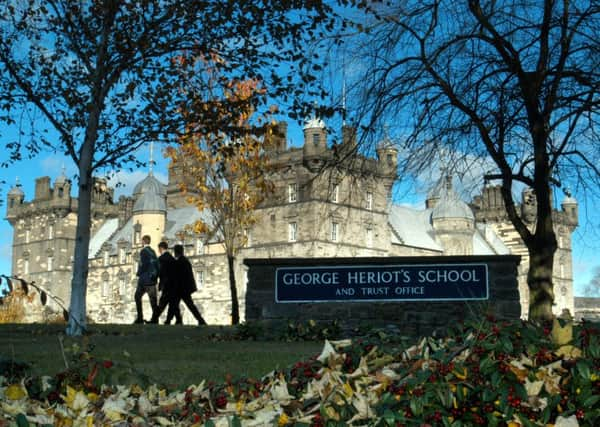Lord Foulkes: Why private schools harm our education system


The will left by Jinglin’ Geordie Heriot -- who made a fortune lending money to King James I and VI -- included a substantial bequest for the establishment of a school for the “puir, faitherless bairns” of Edinburgh.
But, while they may have begun with charitable intentions, George Heriot’s and other private schools created in similar circumstances have moved far away from their roots.
Advertisement
Hide AdAdvertisement
Hide AdSo much so that for such establishments to be classed as charities today is an outrageous anomaly that, to my great regret, no government, Labour or Conservative, has been willing to tackle.
Private schools should pay taxes like any other private enterprise. But their failure to do so is not the only problem; private schools help create division in our society and also have a negative effect on state comprehensives.
And so, in the 1970s, when I was chair of Lothian council’s education committee, we made an attempt to bring George Heriot’s and another leading Edinburgh private school, Mary Erskine, under state control.
Our motivation was neither envy nor dogma but concern that having a quarter of secondary pupils in Edinburgh in private schools was harming the education of the rest.
The Merchant Company had got into financial difficulties and agreed to sell Mary Erskine school to the council. We planned to turn it into the community school for that part of West Edinburgh.
In the case of George Heriot’s, we used the Labour majority on the education committee to install the late Duncan Milligan, father of former Lord Provost Eric Milligan, as chair of Heriot’s Trust and planned to move toward a local intake of pupils from central Edinburgh.
However our plans were thwarted by the General Election of 1979, the election of Margaret Thatcher as Prime Minister and my despatch to South Ayrshire, much to the delight of many former pupils of George Heriot’s.
While in confession mode, and before “disgusted of Ravelston Dykes” writes to point it out, I must admit that I received my secondary education in a private school. That was my mother’s choice.
Advertisement
Hide AdAdvertisement
Hide AdMy contribution was to pass an examination to get a scholarship so it cost her nothing. When it came to the choice of my wife and I, we sent our three children to the local schools, Sciennes, Ayr Grammar primary and Kyle Academy.
In Edinburgh, the social divide is as great as ever. While private schools cream off the richest -- but not always the brightest -- to be educated in small classes with top class facilities, the council schools are increasingly squeezed by both UK and Scottish Governments.
The promised reduction in class sizes has not materialised, in spite of repeated promises. Teachers’ salaries have been held back and we hear stories of parents being asked to contribute to basic school facilities.
It is to the credit of those teaching in the public sector that schools like Boroughmuir and James Gillespie’s have exam results and university entry levels that compare well with the private sector.
But our divided school system means we do not compare well overall with other countries.
The World Economic Forum has compiled a league table of countries and the UK is not in the top 10.
Finland, where there is no banding system and only one mandatory test, at 16, is top, followed by Switzerland, one of the world’s richest countries, where only five per cent of pupils attend a private school.
The others in the top 10 have insignificant private sectors but put proper funding into state schools for all pupils.
Advertisement
Hide AdAdvertisement
Hide AdIn the UK it is the parents of children in the state sector who are subsidising the education of the children of the wealthy in private schools or, as the English so quaintly describe them, “public schools”.
To quote a leading UK politician “removing the tax advantages of private schools would boost standards in the state sector and raise vital extra funds”.
He adds: “Private school fees are VAT exempt which allows the wealthiest in the country to buy a prestige service that secures their children a permanent positional edge in society.
“Are the children of the rich intrinsically more talented and worthy, more gifted and more deserving of celebration than the rest? Of course not. But our state-subsidised private schools continue to give them every possible advantage.”
These are not the words of Jeremy Corbyn but of former Education Secretary, Michael Gove, in a column in The Times in February. I say “hear, hear”.
In Scotland, the power to deal with the anomalous status of private schools lies with the Scottish Government, which claims to be radical.
Whether they are willing to tackle this and face the wrath of the Edinburgh bourgeoisie will be a test of their real radical credentials.
I do have sympathy with the dilemma faced by parents in Edinburgh who wish to do the best for their children.
Advertisement
Hide AdAdvertisement
Hide AdOften many make great sacrifices to pay the fees at private schools. Equally there are many very rich for whom the fees, which are subsidised by taxes of relatively poor people, are petty cash.
Making private schools pay their taxes would have the double advantage of reducing the private sector over time and producing resources to improve the public sector so that the dilemma of anxious parents would be reduced and ultimately eliminated.
Lord (George) Foulkes of Cumnock was a Labour MP, Scotland Minister, and an MSP